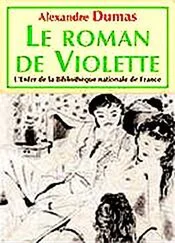Scarcely had he done so when the portière was again lifted, and the person whom he expected entered.
He was a man of about forty, his eyes gray and false, his nose curved like the beak of a screech-owl, his cheek-bones prominent. His face tried to look respectful, but all that he could do was to wear a hypocritical smile on his lips blanched with fear.
Charles gently put his hand behind him, and grasped the butt of a pistol of a new construction, that was discharged, not by a match, as formerly, but by a flint brought in contact with a wheel of steel. He fixed his dull eyes steadily on the newcomer; meantime he whistled, with perfect precision and with remarkable sweetness, one of his favorite hunting-airs.
After a pause of some minutes, during which the expression of the stranger’s face grew more and more discomposed,
“You are the person,” said the King, “called François de Louvièrs Maurevel?”
“Yes, sire.”
“Captain of petardeers?”
“Yes, sire.”
“I wanted to see you.”
Maurevel made a low bow.
“You know,” continued Charles, laying a stress on each word, “that I love all my subjects equally?”
“I know,” stammered Maurevel, “that your Majesty is the father of your people.”
“And that the Huguenots and Catholics are equally my children?”
Maurevel remained silent, but his agitation was manifest to the King’s piercing eyes, although the person whom he was addressing was almost concealed in the darkness.
“Does this displease you,” said the King, “you who have waged such a bitter war on the Huguenots?”
Maurevel fell on his knees.
“Sire,” stammered he, “believe that”—
“I believe,” continued Charles, looking more and more keenly at Maurevel, while his eyes, which at first had seemed like glass, now became almost fiery, “I believe that you had a great desire at Moncontour to kill the admiral, who has just left me; I believe you missed your aim, and that then you entered the army of my brother, the Duc d’Anjou; I believe that then you went for a second time over to the prince’s and there took service in the company of M. de Mouy de Saint Phale”—
“Oh, sire!”
“A brave gentleman from Picardy”—
“Sire, sire!” cried Maurevel, “do not overwhelm me.”
“He was a brave officer,” continued Charles, whose features assumed an aspect of almost ferocious cruelty, “who received you as if you had been his son; fed you, lodged you, and clothed you.”
Maurevel uttered a despairing sigh.
“You called him your father, I believe,” continued the King, pitilessly, “and a tender friendship existed between you and the young De Mouy, his son.”
Maurevel, still on his knees, bowed low, more and more crushed under the indignation of the King, who stood immovable, like a statue whose lips only are endowed with vitality.
“By the way,” continued the King, “M. de Guise was to give you ten thousand crowns if you killed the admiral — was he not?”
The assassin in consternation struck his forehead against the floor.
“As regards your worthy father, the Sieur de Mouy, you were one day acting as his escort in a reconnaissance toward Chevreux. He dropped his whip and dismounted to pick it up. You were alone with him; you took a pistol from your holster, and while he was bending over, you shot him in the back; then seeing he was dead — for you killed him on the spot — you escaped on the horse he had given you. This is your history, I believe?”
And as Maurevel remained mute under this accusation, every circumstance of which was true, Charles IX. began to whistle again, with the same precision and melody, the same hunting-air.
“Now, then, murderer!” said he after a little, “do you know I have a great mind to have you hanged?”
“Oh, your Majesty!” cried Maurevel.
“Young De Mouy entreated me to do so only yesterday, and I scarcely knew what answer to make him, for his demand was perfectly just.”
Maurevel clasped his hands.
“All the more just, because I am, as you say, the father of my people; and because, as I answered you, now that I am reconciled to the Huguenots, they are as much my children as the Catholics.”
“Sire,” said Maurevel, in despair, “my life is in your hands; do with it what you will.”
“You are quite right, and I would not give a groat for it.”
“But, sire,” asked the assassin, “is there no means of redeeming my crime?”
“None that I know of; only if I were in your place — but thank God I am not”—
“Well, sire, if you were in my place?” murmured Maurevel, his eyes fixed on the King’s lips.
“I think I could extricate myself,” said the King.
Maurevel raised himself on one knee and one hand, fixing his eyes upon Charles to make certain that he was not jesting.
“I am very fond of young De Mouy,” said the King; “but I am equally fond of my cousin De Guise; and if my cousin asked me to spare a man that the other wanted me to hang, I confess I should be embarrassed; but for policy as well as religion’s sake I should comply with my cousin De Guise’s request, for De Mouy, brave captain though he be, is but a petty personage compared with a prince of Lorraine.”
During these words, Maurevel slowly rose, like a man whose life is saved.
“In your critical situation it would be a very important thing to gain my cousin De Guise’s favor. So I am going to tell you what he said to me last night.”
Maurevel drew nearer.
“‘Imagine, sire,’ said he to me, ‘that every morning, at ten o’clock, my deadliest enemy passes down the Rue Saint Germain l’Auxerrois, on his return from the Louvre. I see him from a barred window in the room of my old preceptor, the Canon Pierre Piles, and I pray the devil to open the earth and swallow him in its abysses.’ Now, Maître Maurevel,” continued the King, “perhaps if you were the devil, or if for an instant you should take his place, that would perhaps please my cousin De Guise.”
Maurevel’s infernal smile came back to his lips, though they were still bloodless with terror, and he stammered out these words:
“But, sire, I cannot make the earth open.”
“Yet you made it open wide enough for the worthy De Mouy, if I remember correctly. After this you will tell me how with a pistol — have you not that pistol still?”
“Forgive me, sire, I am a still better marksman with an arquebuse than a pistol,” replied Maurevel, now quite reassured.
“Pistol or arquebuse makes no difference,” said the King; “I am sure my cousin De Guise will not cavil over the choice of methods.”
“But,” said Maurevel, “I must have a weapon I can rely on, as, perhaps, I shall have to fire from a long distance.”
“I have ten arquebuses in this room,” replied Charles IX., “with which I can hit a crown-piece at a hundred and fifty paces — will you try one?”
“Most willingly, sire!” cried Maurevel, with the greatest joy, going in the direction of one which was standing in a corner of the room. It was the one which that day had been brought to the King.
“No, not that one,” said the King, “not that one; I reserve that for myself. Some day I am going to have a grand hunt and then I hope to use it. Take any other you like.”
Maurevel took one down from a trophy.
“And who is this enemy, sire?” asked the assassin.
“How should I know,” replied Charles, withering the wretch with his contemptuous look.
“I must ask M. de Guise, then,” faltered Maurevel.
The King shrugged his shoulders.
“Do not ask,” said he; “for M. de Guise will not answer. Do people generally answer such questions? Those that do not wish to be hanged must guess them.”
Читать дальше












